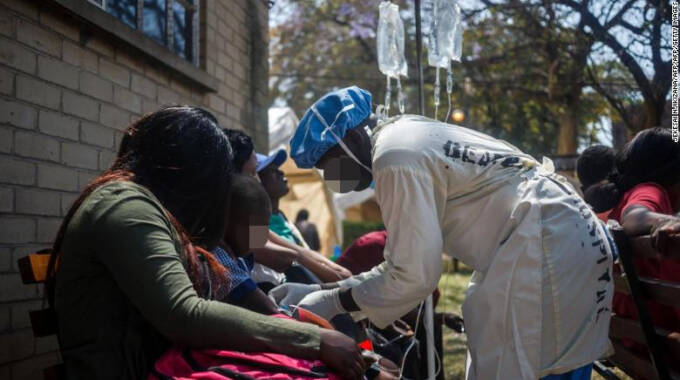
The ManicaPost

Samuel Kadungure
Senior Reporter
THE Ministry of Health and Child Care will hold a provincial sensitisation meeting ahead of the cholera vaccination blitz next week in a bid to reduce any misconceptions that may trigger vaccine hesitancy.
The engagement with civil society organisations, media, faith based organisations, religious and traditional leaders as well as community structures is crucial in creating demand for the immunisation services.
Vaccine hesitancy and the negative influence of anti-vaccine groups has been a huge challenge, with religious objectors and victims allegedly shunning treatment, while in some cases patients present late for treatment, leading to high institutional fatalities.
The cholera vaccination blitz comes as the disease has affected 5 793 people and caused 149 deaths in Manicaland since its outbreak in February 2023.
On January 30, about 29 new suspected cases were recorded in three districts — Chipinge (17), Buhera (five) and Mutare (seven), while three confirmed cases were reported in Burma Valley (two) and Old Mutare (one).
Manicaland Provincial Medical Director (PMD), Dr Munyaradzi Mukuzunga confirmed both the new cases and the sensitisation indaba.
He said the comprehensive grassroots approach will help to address any misconceptions.
Dr Mukuzunga said they will utilise community-initiated ideas to promote acceptance of the cholera vaccine.
“A stakeholder sensitisation program is being planned, maybe next week, and by then you will get to know the quantity of cholera vaccines allocated to Manicaland, as well as how they will be distributed.
“Twenty nine new suspected cholera cases were reported early this week in which Chipinge recorded 17 suspected cases – St Peters (two), Hakwata (three), Veneka (three) and Chisuma (nine), while Buhera had five case at Chiweshe (one), Chiwenga(two) and Munyanyi (two).
Mutare Rural recorded seven suspected cases at Mt Zuma (one), St Andrews (one), Marange (one), Burma Valley (two) and Chitakatira (two),” he said.
Dr Mukuzunga said they had 28 new admissions and 17 discharges early this week.
He said the province has 42 cases currently under admission at Birchenough Bridge Hospital (one), Chapanduka (one), Zangama (one), Betera (one), Murambinda Mission Hospital (two), Chiweshe (five), Chirozva (one), Chitakatira (two),Burma Valley (three),St Andrew’s (two), Chiadzwa (one), Marange (one), Mt Zuma (one), St Peter’s (three), Vheneka (three), Hakwata (three), Chisuma (eight), Mutare Infectious Diseases Hospital (one), Old Mutare(one) and Chakohwa (one).
Dr Mukuzunga said no new deaths were recorded of late due to comprehensive and strategic interventions being deployed to tackle the outbreak.
The interventions saw the provision of lifesaving supplies, services and technical support in water, sanitation, and hygiene.
There have also been social behaviour change interventions integrated across all sectors.
Government, working with its partners – the World Health Organisation, Unicef, Mercy Corps, Red Cross, Médecins Sans Frontières, Higher Life, World Vision and Care, among others – provided an assortment of non-food items like drugs, intravenous rehydration fluids, water chlorinating tablets, cholera beds, soaps and buckets.
They also rehabilitated boreholes, protected springs and refurbished motorbikes to enhance the mobility of infection prevention and control specialists.
Dr Mukuzunga said all gatherings and funerals in cholera-affected areas will continue to be supervised in order to ensure adequate clean water, sanitation provision and other hygienic practices to reduce transmission.
“The biggest danger of cholera is loss of fluid from the body through diarrhoea or vomiting. Do not panic, but act quickly. The sick should drink a lot of fluids like the salt sugar solution made with safe water.
“Oral rehydration solutions are available in some shops, pharmacies, local clinics and village health care workers. Children with cholera need to continue breastfeeding to replenish all the liquids that are lost while being rushed to the nearest health facility,” he said.
He said cholera presents as watery non-foul smelling diarrhoea and is at times accompanied by vomiting.
“All persons with diarrhoea should start salt and sugar solution water and quickly report to nearest health facility. Washing hands with water and soap after using the toilet and before eating remains critical to preventing cholera.
“People should avoid hand shaking as it spreads the disease while funerals and gatherings should be supervised by health care workers,” said Dr Mukuzunga.



